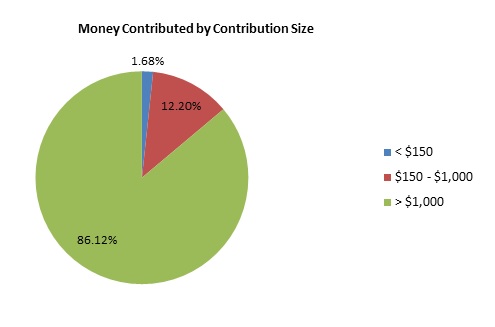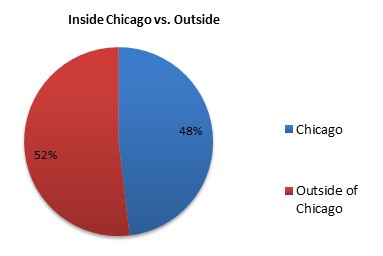Big Money, Money from Outside Chicago, Dominates Mayoral Race
In the wake of the Supreme Court’s decisions undermining campaign finance rules, most notably Citizens United v FEC, our elections have become increasingly dominated by large donors at the expense of ordinary Americans. These effects have been outsized in recent Illinois elections where campaign contribution limits have been lifted in both the gubernatorial and Chicago mayoral elections. This study examines the dominance of big donors in Chicago’s mayoral race.
In the wake of the Supreme Court’s decisions undermining campaign finance rules, most notably Citizens United v FEC, our elections have become increasingly dominated by large donors at the expense of ordinary Americans. These effects have been outsized in recent Illinois elections where campaign contribution limits have been lifted in both the gubernatorial and Chicago mayoral elections. This study examines the dominance of big donors in Chicago’s mayoral race.

Examining quarterly reports to the state board of elections between 2011 and 2014, we found that contributions of greater than $1,000 account for more than eighty-six percent of the money contributed to the five Chicago Mayoral candidates. By contrast, less than two percent of the money contributed came from contributions of less than $150.
Just two top donors together gave more money than all small donors combined – of which there were at least 1,601.

The 2015 Chicago mayoral election is not only dominated by big money, it is dominated by money from outside of Chicago. A slight majority – fifty-two percent — of all money contributed came from donors from outside of Chicago. The bigger the contribution, the more likely that it came from a donor outside of Chicago: sixty percent of the money contributed by donors giving $25,000 or more, eighty percent of the money contributed by donors giving $80,000 or more.
This report analyzes campaign contributions made to the campaign committees of the five Chicago mayoral candidates. We analyzed quarterly reports the committees made to the Illinois State Board of Elections between 2011 and 2014. It is important to note that the last quarterly report ended 12/31/14 and a significant amount of money has been contributed since then. We will update this report with final numbers after campaign reporting is completed.
We looked at several key data points:
- Percentage of money contributed from small, medium, and large donors;
- Percentage of contributions from small, medium, and large donors;
- Number of large donors whose contributions match the contributions by small donors combined; and
- Percentage of money coming from inside and outside of Chicago.
The most important way to look at this data is in aggregate, i.e. combining all campaigns, because this demonstrates the systemic nature of big money dominance. However, because Rahm Emanuel’s campaign is the recipient of the overwhelming majority of all money contributed, we have broken down some of our analysis by candidate, and some by all candidates except Emanuel. All five candidates relied on big donors giving $1,000 or more as their largest source of campaign funding.
Moving from Big Money Dominance to a Small Donor Democracy
For our elections to truly reflect the principle of one person, one vote, without deep-pocketed spenders able to drown out the voices of ordinary Americans, we must adopt common-sense reforms to set reasonable limits on big money, and amplify the impact of small donors.
Fortunately, there is a strong and growing movement to overturn the Citizens United decision and reverse the wrong-headed ruling that money is speech and corporations are people. Already 16 states — including Illinois — and over 600 communities have gone on the record calling for a constitutional amendment to do exactly that.
There are also successful models already in place to empower small donors to allow their voices to play a more central role in our democracy, such as providing tax credits and public matching funds for small donations. For example, in New York City’s 2013 City Council campaigns, small donors were responsible for sixty-one percent of the money contributed to participating candidates, when funds from a matching program are included. In 2009, all but two of the 51 winning candidates in the City Council elections participated in the small donor program, proving that candidates are able to raise the money they need to win without relying on large-dollar contributions. Just a few months ago, Montgomery County, Maryland, became the latest community to adopt one of these programs.
Senator Durbin introduced legislation last year – the Fair Elections Now Act – that would create a similar small donor empowerment program for U.S. Senate elections. The House version of the bill, The Government by the People Act [H.R. 20], has 142 co-sponsors, including nine Illinois Representatives: Bustos, D. Davis, Duckworth, Foster, Gutierrez, Kelly, Quigley, Rush, and Schakowsky.
Thanks to Fair Elections Illinois, representing over a dozen local organizations, voters in Chicago have the opportunity to weigh in on whether Chicago or the state of Illinois should adopt these reforms by voting on a non-binding referendum question, which reads:
Should the City of Chicago or the State of Illinois reduce the influence of special interest money in elections by financing campaigns using small contributions from individuals and a limited amount of public money?
All five mayoral candidates have endorsed the question.
If elections remain a contest of which candidates can appeal most to a narrow set of big donors, our democracy will continue to suffer. Reforms are needed to make sure all of our voices count.